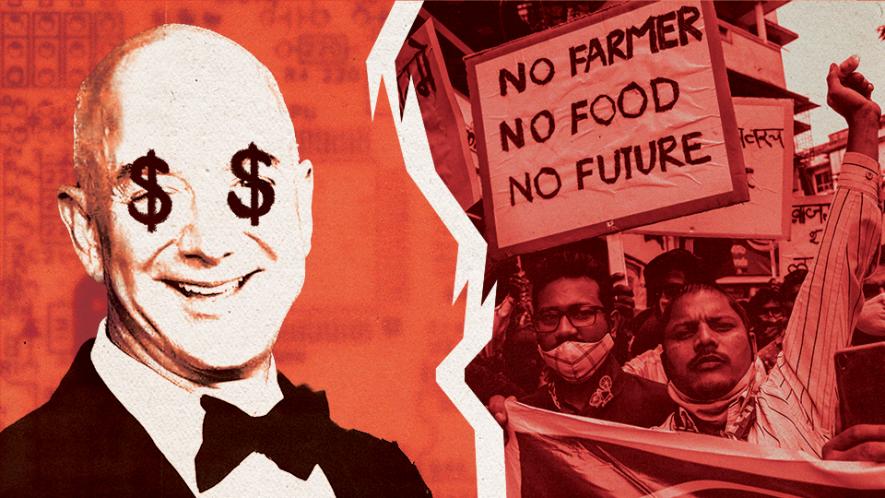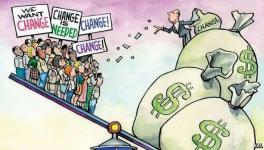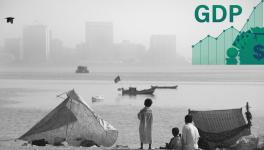The Rich Get Richer While Global Poverty Deepens in “Decade of Division”

The wealth of the world’s top five richest men has more than doubled since 2020 while 4.8 billion people, or 60% of humanity, have been further impoverished. At this rate, while it could only take a decade for the world to have its first trillionaire, it will take 229 years to ensure that no person is living in poverty.
These findings are part of a new report titled Inequality Inc. published by Oxfam International, released on the eve of the World Economic Forum meeting in Davos, Switzerland.
“We’re witnessing the beginnings of a decade of division, with billions of people shouldering the economic shockwaves of pandemic, inflation and war, while billionaires’ fortunes boom. This inequality is no accident; the billionaire class is ensuring corporations deliver more wealth to them at the expense of everyone else,” stated Amitabh Behar, Oxfam’s interim Executive Director, in a press release.
Neo-colonial divide
The inequality gap between the Global North and the Global South has increased for the first time in 25 years.
Rich countries of the Global North account for 69% of all global wealth and 74% of all billionaire wealth. This concentration of wealth is a legacy of colonialism and empire, the report notes, adding that “since the formal end of colonialism, “neo-colonial relationships with the Global South persist, perpetuating economic imbalances and rigging the economic rules in favor of rich nations.” This extraction of wealth has been facilitated by multinational corporations.
Meanwhile, inequalities have also been reproduced within Global North countries, where marginalized and racialized communities are facing the brunt.
Corporate greed drives inequality
Seven out of 10 of the world’s largest corporations have a billionaire either as CEO or the main shareholder. These companies have a worth of USD 10.2 trillion, surpassing the combined GDPs of all countries in Latin America and Africa.
Meanwhile, according to Oxfam’s analysis of data from the World Benchmarking Alliance, only 0.4% of the world’s over 1,600 largest companies have publicly committed to paying their workers and supporting paying workers along their value chains a minimum wage.
The rich have also extracted benefit from their shareholder positions — with the top 1% owning 43% of all global financial assets. The figure stands at 48% in the West Asia/Middle East region, 50% in Asia, and 47% in Europe.
For every USD 100 in profit made by 96 big corporations between July 2022 and June 2023, USD 82 went to shareholders in the form of stock buybacks and dividends. On the whole, in the 12 month period up to June 2023, 148 of the biggest corporations globally had raked in USD 1.8 trillion in profits.
According to the World Inequality Lab, in 2022, the poorest 50% of the world’s population earned just 8.5% of global income.
The majority of people are able to afford less with their wages each month despite working for longer hours in unsafe and precarious conditions. The wages of 791 million workers have failed to keep up with inflation, to the extent that workers have lost USD 1.5 trillion in just the last two years. This is equal to 25 days of lost wages per worker, Oxfam has stated.
The difference between the wealth of the ultra rich as compared to the wages of workers is so vast that, according to the report, it would take a female worker in the health or social sector 1,200 years to earn what the CEO of a Fortune 100 company makes in a single year.
Importantly, beyond a persisting gender gap in income, the unpaid care work performed by women has subsidized the economy to the tune of at least USD 10.8 trillion each year. This is three times the economic contribution of the global tech industry, which has benefited from government support and subsidies the world over.
Oxfam argues that a “key instrument” that has exacerbated global inequality is the growth of monopoly power, which has allowed a handful of corporations to manipulate and influence entire economies and governments, such as price gouging, suppressing wages, privatizing public services in pursuit of profit, and shaping labor laws and policies which includes restrictions on workers’ rights to unionize.
The report quotes Chile’s former democratic socialist president Salvador Allende, who was overthrown in a US-backed coup, who had warned that “‘We are faced by a direct confrontation between the large transnational corporations and the states. The corporations are interfering in the fundamental political, economic and military decisions of the state.”
Oxfam also cites a study by the International Monetary Fund (IMF) which found that monopoly power was responsible for 76% of the decline witnessed in labor income share in the manufacturing sector in the US.
“Monopolies harm innovation and crush workers and smaller businesses. The world hasn’t forgotten how pharma monopolies deprived millions of people of COVID-19 vaccines, creating a racist vaccine apartheid, while minting a new club of billionaires,” Behar stated.
Between 1995 and 2015, 60 pharmaceutical companies merged into just 10 “Big Pharma” firms. Despite the fact that innovation is made largely possible through public funding, Big Pharma monopolies have aggressively used intellectual property and global trade rules to restrict access to life-saving medications and vaccines, as has most recently been witnessed during the COVID-19 pandemic.
Moreover, “economies across the Global South are locked into exporting primary commodities, from copper to coffee, for use by monopolistic industries in the Global North, perpetuating a colonial-style ‘extractivist’ model,” the report states.
Beyond market concentration and monopoly power, corporations and their owners have shored up their wealth by waging a “sustained and highly effective war on taxation… depriving the public of critical resources.”
Between 1975 and 2019, while many corporations made record profits, the corporate tax rate dropped from 23% to 17%. In 2022, around USD 1 trillion in profits were transferred to tax havens.
The neoliberal “Wall Street consensus”
The collapse of corporate taxation is partly a result of “the broader neoliberal agenda promoted by corporations and their wealthy owners, often alongside Global North countries and international institutions such as the World Bank.”
Lack of corporate revenue also affects funds for “inequality-busting public services”. For instance, in Morocco, tax incentives, 43.9% of which benefited corporations, surpassed the country’s entire health budget for 2021.
The impact on public services, and by extension on those who rely on these services not only as consumers but as workers, is particularly acute in a context of the debt crisis in the Global South. Between now and 2029, low and lower- middle income countries will pay almost half a billion US dollars a day in interest and debt payments.
High levels of debt coupled with corporate tax dodging under the eye of the IMF and World Bank lead to austerity policies across critical sectors including health and social protections.
While the ability of governments to sustain public services is obstructed, corporations around the world have pushed for the privatization of critical services including health care and education. As the report states, this is done not only through the sale of public assets, but also through the integration of the private corporate sector into public policies and programs through outsourcing and “public-private partnerships”. Privatization in turn grants corporations greater influence over public resources.
“Major development agencies and institutions, many of which have adopted policies that prioritize private provision of services, have found common ground with investors by embracing approaches that ‘de-risk’ such arrangements by shifting financial risk from the private to the public sector”, the report states.
“This new ‘Wall Street Consensus’ reframes the ‘Washington Consensus’ in the language of contemporary development speak, and envisions the transformation of basic services such as education, healthcare and water into financial assets backed by public resources.”
Submitting basic public services, access to which should be universal, to the logic of private profit-making, has worked to deny access to marginalized and historically oppressed communities and has worsened inequalities.
Corporations, especially in the fossil fuel industry, have also been responsible for driving the global climate crisis, while pushing market-based false solutions that exacerbate poverty and inequality. Not only have fossil fuel companies suppressed climate science and lobbied at both national and international levels to influence policy, they have used “litigation terrorism” to crack down countries that have taken measures to protect the environment.
Oxfam’s report calls on governments to take steps to build an “economy for all”. This includes “revitalizing the state” to ensure universal provision of key services such as health care and education as well as a public monopoly or a public option in sectors including energy and transport.
It further calls on states to “rein in the runaway power of corporations”, including breaking up private monopolies, “democratizing trade” and ending “abuse of patent rules”, putting in place legislations to protect wages and introducing taxes on corporations and rich individuals including through permanent wealth and excess profit taxes.
Get the latest reports & analysis with people's perspective on Protests, movements & deep analytical videos, discussions of the current affairs in your Telegram app. Subscribe to NewsClick's Telegram channel & get Real-Time updates on stories, as they get published on our website.
























